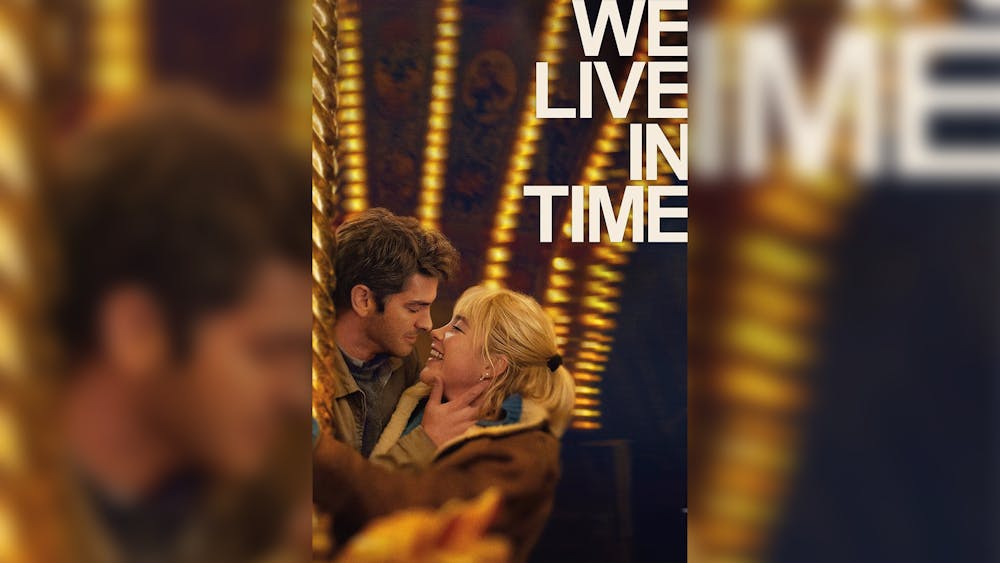Triumphs and tragedy come together, capturing the complexities of the human experience and the passage of time. On Wednesday, Oct. 9, Harkins Theatre at Tempe Marketplace hosted an eagerly anticipated early screening of “We Live in Time,” written by Nick Payne and directed by John Crowley.
“We Live in Time” is a visually stunning film following Almut (Florence Pugh) and Tobias (Andrew Garfield) as they explore the intricacies of their relationship, confronting profound challenges that threaten to shorten their moments together.
What makes the film captivating is how the story unfolds out of chronological order, giving the audience a nuanced understanding of Almut and Tobias's relationship. Each scene leaves viewers guessing whether they are witnessing moments from the past, present, or future. The abrupt time switches are nebulous at the start, with nothing but little clues to orient viewers to a point in their relationship timeline. The film frequently switches between Almut being pregnant and living with Tobias, to the two of them barely meeting, and then to their child being a toddler. The only way to know what point in time the scenes are occurring is by looking at the changes in Almut’s hair or whether she has a pregnant belly.
This film is more than a romance; it is a stirring exploration of several insightful themes, including the desire to be remembered, living in the present, and, of course, time’s unfolding.
The Desire to Be Remembered
Almut’s journey is marked by her struggle to embrace her identity as a mother while yearning for something beyond that label. She grapples with the weight of knowing she doesn’t have much time with her family, longing to carve out her own legacy once she leaves. In a heated argument with Tobias, she expresses her fear of being reduced to just “someone’s dead mother,” a reminder of her desire to be seen as more than just a mom, but as an individual with dreams and aspirations. She wants to have achievements for her daughter to remember rather than merely fading memories as she grows. This internal conflict significantly impacts Almut and Tobias's relationship. While Almut is focused on leaving a lasting impression for their daughter, Tobias prioritizes living in the moment, creating memories with their daughter. This is the stark difference between the two characters; one is thinking ahead and the other is thinking in the present, a theme that is suggested within the title of the film.
Living in the Present
Tobias wanted to be supportive of Almut and her choices as she battled ovarian cancer. Yet, Tobias’s ideas for spending the time they had left together as a family differed from Almut’s, who wanted to leave a lasting legacy. Tobias focused on nurturing their family bond, planning a summer wedding for June 5, and even touring venues together with Almut and their daughter. He wanted Almut to feel healthy and comfortable, hoping to keep her from unnecessary stress. Yet, when he discovered that Almut had secretly begun training for a demanding cooking competition, he erupted. Their differences in perspective kept them from seeing eye to eye, and the couple argued until the truth was revealed to Tobias that Almut’s cooking competition fell on the same day as their wedding. After the argument, and in a devastatingly sad scene, viewers see Tobias throw out all of the wedding invitations as he weeps. This was the beginning of Tobias’s acceptance that Almut was going to live out the last of her time as she saw fit, and there was nothing he could do about it.
Time’s Unfolding
The most valuable thing a human possesses is time, and “We Live in Time” delves deeply into this exploration. Early on in the film, viewers are presented with the news of Almut’s cancer, and she would rather create amazing memories in a shorter span of time than endure a longer life filled with suffering. Both Almut and Tobias were ready to make the most of their time together, even with their different perspectives. The film is a beautifully wrapped wake-up call to the unforgiving nature of time, encouraging viewers to make the most of the little time they have on this earth. As their story unfolds, Almut and Tobias prove there is no loss without love, and neither can be true without the other.
With compelling performances by Garfield and Pugh, “We Live in Time” left the audience tearfully embracing the fleeting moments that define our existence. The emotional weight of Almut and Tobias’s journey resonates long after the credits roll, serving as a powerful reminder of the finite nature of love and life.

